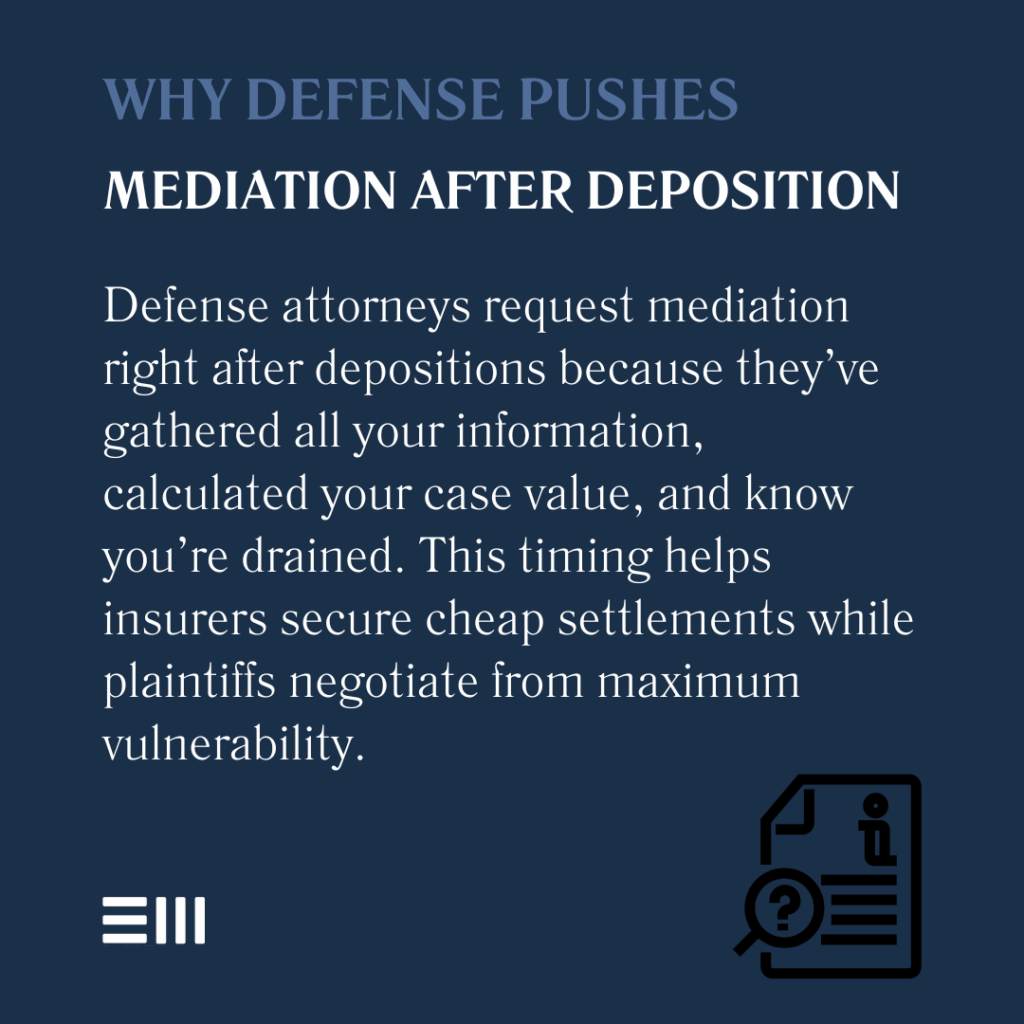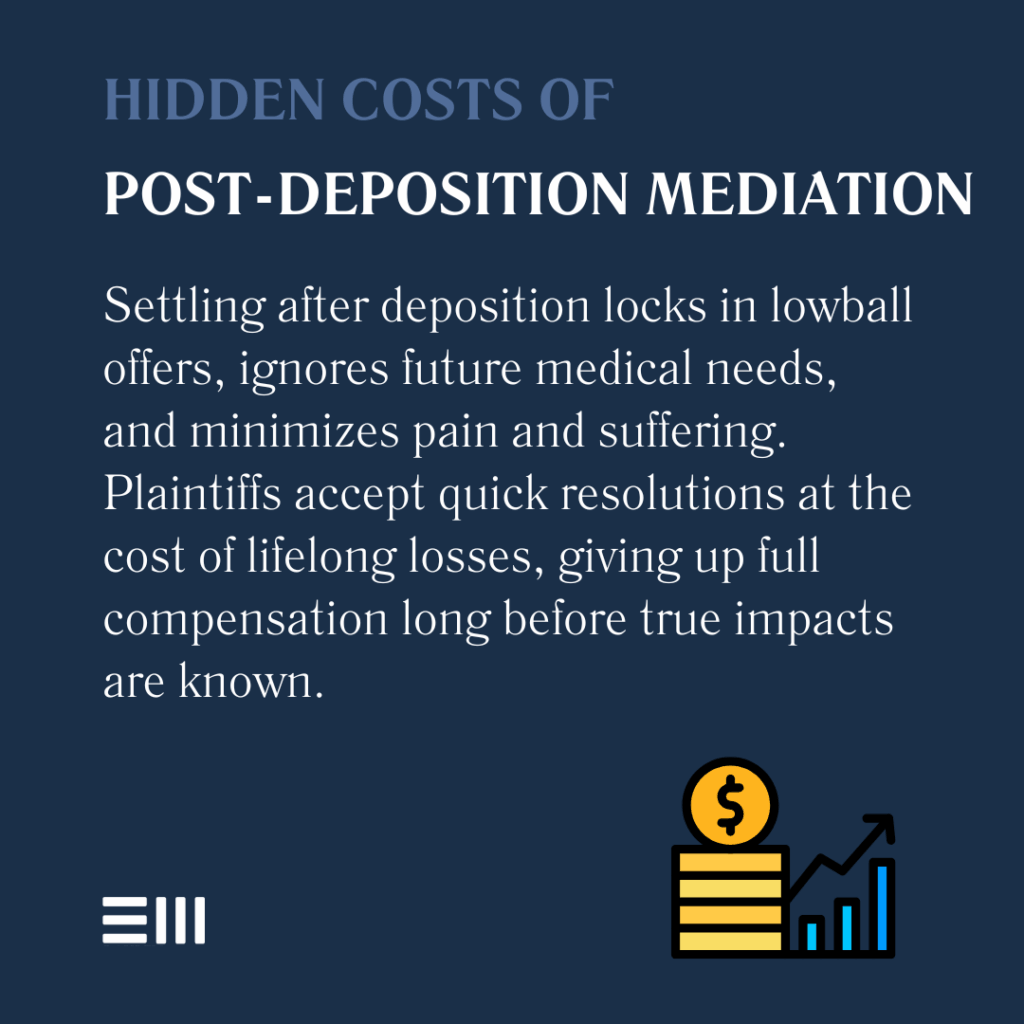
Defense attorneys push mediation after depositions because it consistently produces lower settlements than trials.
After depositions reveal your case strength, insurance companies promote mediation as a cost-saving measure—for them, not you.
The timing isn’t coincidental: they’ve seen your cards and calculated exactly how little they can pay.
Understanding Post-Deposition Mediation Dynamics
Mediation after deposition fundamentally shifts power dynamics in personal injury cases, creating environments in which plaintiffs operate at a maximum disadvantage.
Insurance companies strategically time requests after gleaning crucial deposition information while hiding their strategies.
During depositions, plaintiffs reveal everything: injury details, treatment history, emotional impacts, and witness testimony. Defense attorneys probe for weaknesses and admissions undermining case value. This one-sided exchange leaves plaintiffs exposed while defendants remain protected.
The psychological toll also factors into defense strategy. Plaintiffs feel drained and eager to avoid trial after aggressive questioning. Insurance companies exploit this by presenting mediation after deposition as a reasonable alternative.

Strategic Disadvantages of Timing
Post-deposition mediation creates multiple disadvantages systematically favoring defendants over injured plaintiffs.
Understanding why personal injury plaintiffs should never mediate after deposition requires examining these structural problems that make this timing particularly harmful to fair compensation.
- Information asymmetry peaks after depositions.
- Settlement authority remains hidden.
- Psychological pressure intensifies following depositions.
- Time constraints favor unlimited defendant resources.
- Mediator influence reflects defense perspectives.
- Negotiation dynamics start from low baselines.
These disadvantages compound throughout sessions. Plaintiffs negotiate from maximum exposure while defendants maintain advantages gained through testimony.
Understanding deposition preparation strategies helps protect your interests.
Hidden Costs of Settlements
Mediation after deposition carries hidden costs that plaintiffs rarely anticipate. Understanding these reveals why trial provides superior outcomes.
- Lowball anchoring establishes inadequate starts.
- Future medical needs get minimized.
- Non-economic damages receive token consideration.
- Life care plans face challenges.
- Lost capacity gets reduced arbitrarily.
Compromises reflect mediation’s bias toward quick resolution over fair compensation. Mediators push settlements by highlighting risks while downplaying inadequacies.

Long-Term Consequences
Beyond immediate impacts, settlements create lasting consequences. Confidentiality prevents warning others. Releases bar future claims.
Quick settlements occur before understanding the full impacts. The risks of settling your case too early extend beyond financial losses.
Consequences become apparent only after signing agreements forever limiting recovery.
Why Insurers Push This Process
Insurance companies aggressively promote mediation after deposition for calculated reasons, prioritizing profits over fair compensation.
Post-deposition timing allows maximum intelligence gathering while minimizing payouts. Companies know juries often award higher compensation than mediated settlements.
They understand exhaustion makes plaintiffs susceptible to lowball offers. This data proves why personal injury plaintiffs should never mediate after deposition.
Professional mediators maintain insurance relationships, creating biases toward any settlement. The industry depends on repeat defendant business, not one-time plaintiffs. This is why personal injury plaintiffs should never mediate after deposition without understanding these dynamics.
Power of Trial Leverage
Rejecting mediation after deposition preserves trial leverage, driving superior settlements. Experienced attorneys often advise against mediation for this reason.
- Jury sympathy drives verdicts.
- Punitive potential threatens defendants.
- Public exposure damages reputations.
- Precedent risks affect future cases.
- Emotional testimony resonates strongly.
Uncertainty motivates higher offers approaching trial. Mediation eliminates pressure by providing certainty at discounts.
Building Value
Cases strengthen between deposition and trial. Experts develop presentations. Evidence crystallizes injuries. Witness preparation improves.
Research uncovers precedents. Proper trial preparation, including evidence gathering, maximizes case value.
Mediation after deposition freezes value at suboptimal levels before this crucial development.
Alternative Strategies
Smart plaintiffs pursue alternatives, maintaining leverage while moving toward resolution, avoiding inherent mediation disadvantages. Understanding mediation and alternative dispute resolution options helps make informed decisions.
Direct attorney negotiation preserves confidentiality without pressure. Judge conferences provide neutral evaluation without binding outcomes. Continued discovery strengthens cases before discussions.
Trial preparation demonstrates commitment. These strategies explain why personal injury plaintiffs should never mediate after deposition when alternatives exist.
Alternatives keep plaintiff control rather than ceding power to defendant-benefiting processes.
Frequently Asked Questions About Mediation After Deposition
Understanding why personal injury plaintiffs should never mediate after deposition raises important strategic questions.
What if Judges Order Mediation?
Court orders require attendance, not settlement. Participate without accepting inadequate offers. Good faith means considering proposals, not accepting them. Review deposition tips and strategies to understand your rights.
Don’t Most Cases Settle Anyway?
Yes, but timing matters. Pre-trial settlements average significantly higher. Approaching trial dates motivate maximum offers versus mediation discounts.
What About Cost Savings?
Mediation costs often equal trial preparation while producing inferior results. Time savings prove illusory when settlements fail covering long-term needs.
Can’t I Reject Bad Offers?
Technically yes, but psychology pressures acceptance. Mediators push any compromise. Process momentum favors settlement over walking away.
How Do I Evaluate Risk?
Experienced attorneys evaluate prospects based on evidence, not scare tactics. Strong cases rarely receive fair mediation offers because defendants know exposure. This demonstrates why personal injury plaintiffs should never mediate after deposition.
Let Justice Roll
Insurance companies push mediation after deposition, knowing it saves millions while shortchanging plaintiffs. You’ve revealed case strengths—don’t compound disadvantages by negotiating from weakness.
Our experienced personal injury attorneys here at Baxley Maniscalco understand why mediation after deposition typically fails plaintiffs and how maintaining leverage maximizes compensation.
Your injuries deserve more than insurance leftovers. We prepare for trial, creating pressure, driving real offers—not mediation discounts.
Contact Baxley Maniscalco today to discuss why rejecting mediation after deposition could mean the difference between inadequate compensation and deserved recovery.
Can't find what you're looking for? Search our site below.










